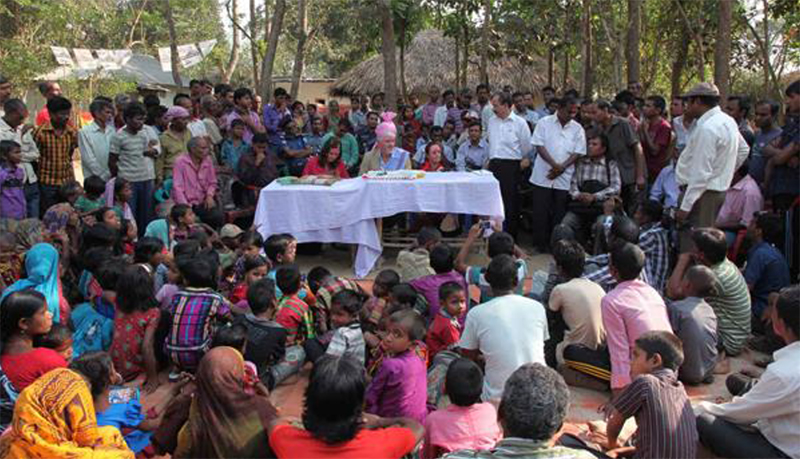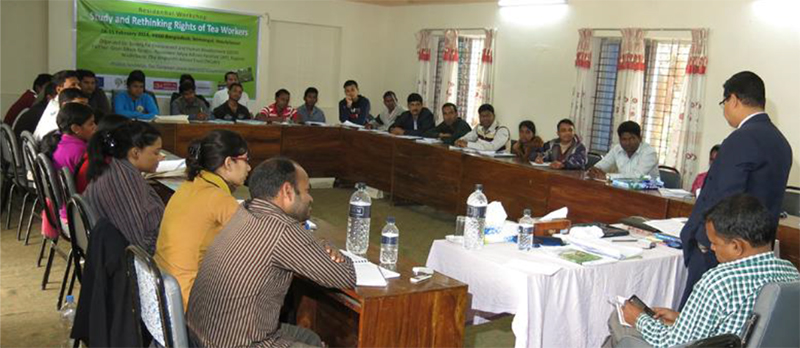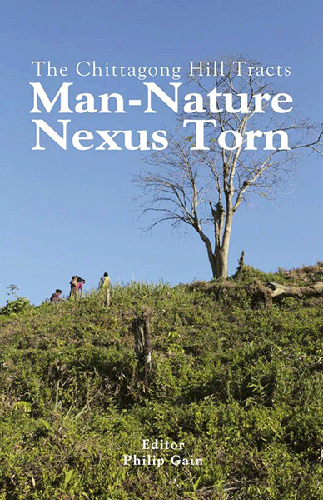
EU ambassador visits labour line, condemns extreme low wages to tea workers
EU ambassador among a tea community in a labour line in Alynagar Tea Estate. © Saydur Rahman
“The workers in Bangladesh tea industry DO NOT get decent wage, this is NOT fair, this is NOT just,” ambassador of the EU Delegation to Bangladesh William Hanna said during his visit to a project that is involved in a participatory research with tea workers and little-known ethnic communities with an aim to improve their living and working conditions. The project titled “Mapping and Capacity Building of Tea Workers and little known ethnic communities in Bangladesh” is implemented by the Society for Environment and Human Development (SEHD). The European Union finances the project under the European Instrument for Democracy and Human Rights. ICCO COOPERATION the Netherlands provides 20% of the total budget of the project.
“This is not just that people should not get fair wage for their work. This is a question of justice. If anybody asks me if I am satisfied; No, I am not satisfied with what I see. This is injustice. So I will go back to Dhaka, talk to minister of commerce Tofail Ahmed, I will talk to minister of agriculture Matia Chowdhury and say, what is this injustice (going on) in your country?”
Ambassador Hannah spoke very boldly in front of an audience comprising tea garden owners, tea community leaders, government officials and reporters of print and electronic media. The meeting took place in Project Development Unit (PDU) auditorium in Srimongol, Maulvibazar on 17 March.
“Why does the European Union have to come in here and look at this question? Because we are concerned about justice, worldwide. And this particular example is worse than other countries; I have been in the Africa, in Tanzania; I have seen the people who work there, I was in Cameroon, I have seen people who work there; and in this country (Bangladesh) they have been treated worse. That’s a fact, we all know it. Why are people being paid so little, I don’t know, I don’t get it,” Ambassador continued with apparent surprise. He called upon everybody to work together to come out of the model that was introduced by, as dubbed by many, the British colonizers, and ensure that the workers get enough money so they can send their children to schools, have a decent life, have medical care and not live a back-breaking life they live today.
The EU ambassador also spoke about tourism potentials in the tea garden areas. He mentioned that he had visited Baikka Beel, a wetland near Maulvibazar that very morning and watched at least 20 different species of birds there. To him, tourism can help solve unemployment problem in the area. “It is in everybody’s interests to ensure that the living conditions of these deprived communities of workers become more humane, so that they can actively participate in the building of a prosperous Bangladesh,” said Ambassador Hanna.
Facilitated by Philip Gain, Director or SEHD, others who spoke at the meeting included trade union leaders in tea industry Rambhajan Kairi and Bijoy Bunarjee; Golam Mohammad Sibly, chairman of Bangladesh Tea Association (BTA) Sylhet Branch; Harun-Or-Rashid, director of Project Development Unit (PDU); Hasna Hena Khan, program officer of ICCO COOPERATION; and Nasim Anwar, a former planter and consultant in the tea sector.
After the meeting, the ambassador visited a labour line in Alynagar Tea Estate to see the living conditions of tea workers in his own eyes. There he was welcomed very warmly by the tea workers and their families.
Tea workers and their communities are one of the most marginalized and excluded groups in Bangladesh, being effectively ‘tied’ to the tea gardens where they work. The level of deprivation is illustrated when comparing their wages to what is paid in other countries in the region. The daily pay in Bangladesh is 69 Taka, a dramatically low pay considering that the daily cash of tea workers in Sri Lanka is with 550 Rupee (328 Taka) about 5 times as high.
The project “Mapping and capacity building of tea plantation workers and little-known ethnic communities of Bangladesh” is being implemented in tea growing areas in the Northeast, Chittagong, North-Centre, Northwest and the Chittagong Hill Tracts (CHT). It has a target population of about 1.1 million people (600,000 tea workers and 500,000 members of little-known ethnic communities).
PDF version of report [ Download ]
The writer is research and documentation officer of Society for Environment and Human Development (SEHD)
First Published: Dhaka Courier, 27 March 2014


 Capacity Building of Tea Workers and little known ethnic communities in Bangladesh” is implemented by the Society for Environment and Human Development (SEHD). The European Union finances the project under the European Instrument for Democracy and Human Rights. ICCO COOPERATION the Netherlands provides 20% of the total budget of the project.
Capacity Building of Tea Workers and little known ethnic communities in Bangladesh” is implemented by the Society for Environment and Human Development (SEHD). The European Union finances the project under the European Instrument for Democracy and Human Rights. ICCO COOPERATION the Netherlands provides 20% of the total budget of the project. “Why does the European Union have to come in here and look at this question? Because we are concerned about justice, worldwide. And this particular example is worse than other countries; I have been in the Africa, in Tanzania; I have seen the people who work there, I was in Cameroon, I have seen people who work there; and in this country (Bangladesh) they have been treated worse. That’s a fact, we all know it. Why are people being paid so little, I don’t know, I don’t get it,” Ambassador continued with apparent surprise. He called upon everybody to work together to come out of the model that was introduced by, as dubbed by many, the British colonizers, and ensure that the workers get enough money so they can send their children to schools, have a decent life, have medical care and not live a back-breaking life they live today.
“Why does the European Union have to come in here and look at this question? Because we are concerned about justice, worldwide. And this particular example is worse than other countries; I have been in the Africa, in Tanzania; I have seen the people who work there, I was in Cameroon, I have seen people who work there; and in this country (Bangladesh) they have been treated worse. That’s a fact, we all know it. Why are people being paid so little, I don’t know, I don’t get it,” Ambassador continued with apparent surprise. He called upon everybody to work together to come out of the model that was introduced by, as dubbed by many, the British colonizers, and ensure that the workers get enough money so they can send their children to schools, have a decent life, have medical care and not live a back-breaking life they live today. After the meeting, the ambassador visited a labour line in Alynagar Tea Estate to see the living conditions of tea workers in his own eyes. There he was welcomed very warmly by the tea workers and their families.
After the meeting, the ambassador visited a labour line in Alynagar Tea Estate to see the living conditions of tea workers in his own eyes. There he was welcomed very warmly by the tea workers and their families.

 Kairi, a labor leader and a staff of SEHD said, according to the law, workers of all industries are entitled to 10 days of casual leave, which is not applicable to tea workers. Besides, tea workers enjoy one day of annual leave for every 22 days of work while workers of other industries get one day leave against every 18 days work.
Kairi, a labor leader and a staff of SEHD said, according to the law, workers of all industries are entitled to 10 days of casual leave, which is not applicable to tea workers. Besides, tea workers enjoy one day of annual leave for every 22 days of work while workers of other industries get one day leave against every 18 days work. Beside sharing information with others and learning from avid researchers, participants received hands-on experience in conducting focus group discussion (FGD), face-to-face interview, and writing case studies in the unique training. Each of them was grouped with a small team that visited a couple of labor lines in five tea gardens. Every team conducted a FGD with Panchayet (an elected body of representatives of tea workers to look after various issues of a labor line) members and filled in a questionnaire that was designed to collect data on socio-economic status and ethnic composition of tea communities. Each participant also interviewed at least one tea worker and wrote case studies on issues ranging from health to education, livelihood to landlessness.
Beside sharing information with others and learning from avid researchers, participants received hands-on experience in conducting focus group discussion (FGD), face-to-face interview, and writing case studies in the unique training. Each of them was grouped with a small team that visited a couple of labor lines in five tea gardens. Every team conducted a FGD with Panchayet (an elected body of representatives of tea workers to look after various issues of a labor line) members and filled in a questionnaire that was designed to collect data on socio-economic status and ethnic composition of tea communities. Each participant also interviewed at least one tea worker and wrote case studies on issues ranging from health to education, livelihood to landlessness. In response to such query DDL confessed his limitations as a government official and said that he would hold elections if directed by the government.
In response to such query DDL confessed his limitations as a government official and said that he would hold elections if directed by the government. Md. Haroon-Or-Rashid Sarker, director, Project Development Unit (PDU), Bangladesh Tea Board said that the owners of tea gardens make high profit. He opined that if the owners of tea gardens spend more from this huge profit for the workers, it will benefit the industry itself in the end. “The ration provided to the workers is of inferior quality. If the workers are sick all the time, it hampers production. These problems can be solved easily,” Rashid said.
Md. Haroon-Or-Rashid Sarker, director, Project Development Unit (PDU), Bangladesh Tea Board said that the owners of tea gardens make high profit. He opined that if the owners of tea gardens spend more from this huge profit for the workers, it will benefit the industry itself in the end. “The ration provided to the workers is of inferior quality. If the workers are sick all the time, it hampers production. These problems can be solved easily,” Rashid said.